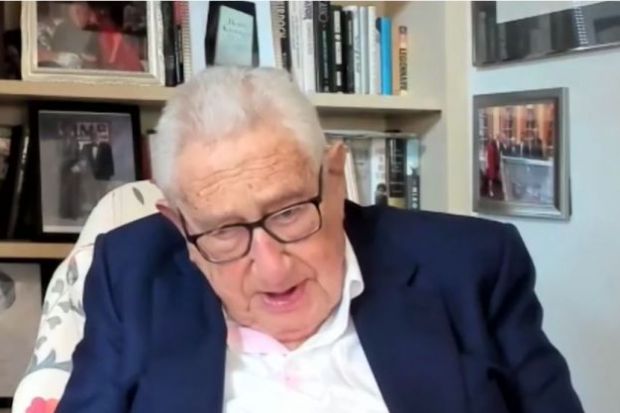US foreign policy giant Henry Kissinger has urged budding scientists to steep themselves in history and other humanities to better understand the social impact of their discoveries – particularly runaway breakthroughs in artificial intelligence.
Speaking at a conference of Nobel laureates, Dr Kissinger, an international relations scholar who shaped US foreign policy in the 1970s as national security adviser and then secretary of state, said it was crucial for researchers to tie “scientific capacities to long-range thinking about the nature of our societies”.
At this year’s Lindau Nobel Laureate Meeting, an annual get-together of prizewinners and young scientists, he urged them to extend their training into “some reflections on history and society…not that they become necessarily experts in both fields, but that they have enough of an understanding of the nature of how these fields work”, he told the conference, this year being held online. “Because science has now become so capable of penetrating into aspects of human existence in ways that were inconceivable before.”
Now 98, Dr Kissinger’s latest preoccupation is the rise of AI, and specifically what it means for how humans perceive the world. He told delegates it would have as revolutionary an impact on human consciousness as the invention of the printing press.
He has co-authored The Age of A.I. and Our Human Future, with former Google chief executive Eric Schmidt and Dan Huttenlocher, the dean of the Massachusetts Institute of Technology’s Schwarzman College of Computing.
The book, out in October, is set to argue that AI “affects our relationship with knowledge, impacts our world views, and changes society and politics in profound ways”.
“We have to develop a conceptual understanding that is parallel to the enormous advances science has made,” Dr Kissinger told the Lindau conference.
He described how his views on international relations had been formed in the age of nuclear weapons, when at least some form of arms control was possible, for example by controlling the number of warheads.
But with AI, “there’s nothing equivalent of that now”, he warned. “The impact of AI on weapons technology multiples the dangers of nuclear weapons.”
“We can’t do without arms control,” he said. At first, he said his concerns about AI had been dismissed, but were now “beginning to be taken more seriously”.
But the challenge for scientists and politicians was broader than simply understanding AI’s impact on weapons, he argued.
Instead, they had to grapple with what would happen when the technology upended a multitude of fields and explore “the nature of thinking that develops when AI becomes a dominant element of operational science”.
Dr Kissinger revealed that as an undergraduate at Harvard University, he toyed with further studies in chemistry before ultimately specialising in diplomacy.
His Nobel Peace Prize, awarded in 1973 for negotiating a peace deal in Vietnam, ranks as one of the most controversial decisions in the history of the awards.
Register to continue
Why register?
- Registration is free and only takes a moment
- Once registered, you can read 3 articles a month
- Sign up for our newsletter
Subscribe
Or subscribe for unlimited access to:
- Unlimited access to news, views, insights & reviews
- Digital editions
- Digital access to THE’s university and college rankings analysis
Already registered or a current subscriber? Login








